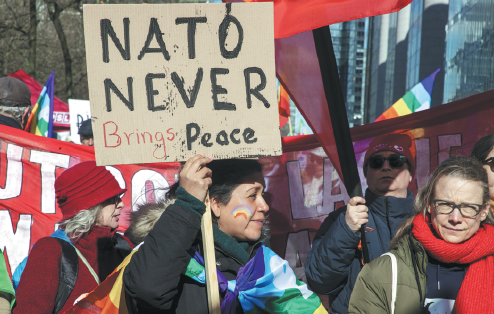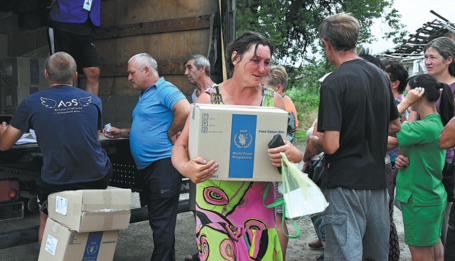Divisions loom over NATO meet
No consensus yet on form of support for Ukraine, while questions hang over Sweden's bid

Editor's note: Divisions among the 31 members are likely to cast a cloud on the upcoming NATO summit on July 11-12 in Vilnius, Lithuania. More than 30 years after the end of the Cold War, the military alliance is eyeing further expansion. This page takes a look at the bloc's expansion path, its role in the Russia-Ukraine conflict and the casualties inflicted by its forces.
The NATO summit to be held on July 11-12 in Vilnius, Lithuania, will try to present its unity to the world but divisions among its European members on some key issues are likely to cast a shadow, according to officials and experts.
The announcement by Washington on Friday to provide the controversial cluster bombs to Ukraine has already upset some NATO members. Seventeen EU member states are among the more than 100 parties to the Convention on Cluster Munitions which bans weapons that could cause severe damage and pose risk to civilians. Cyprus signed the treaty but has yet to ratify it.
"No to cluster bombs and yes to the legitimate defense of Ukraine, which we understand should not be carried out with cluster bombs," Spanish Defense Minister Margarita Robles said on Saturday. Germany, the United Kingdom and Canada have also opposed the move.
Of the EU's 27 member states, 22 are among the 31-member NATO.
Ding Chun, director of the Center for European Studies at Fudan University, said that the EU has to some extent been hijacked by NATO due to the Russia-Ukraine conflict.
"EU can't totally separate itself from NATO, but it also doesn't want to be controlled by NATO, which is led by the United States," he said.
Ding said the US has its own strategic thinking and will pursue its own interests, which may not completely align with those of the EU, including issues regarding the South China Sea and Taiwan Strait.
France has blocked a NATO plan to open a liaison office in Japan, something the US and NATO Secretary-General Jens Stoltenberg are pushing for at the Vilnius summit.
French President Emmanuel Macron has long opposed NATO's expansion beyond its original North Atlantic focus. "We are not in favor as a matter of principle," an Elysee Palace official said on Friday, adding that "NATO means North Atlantic Treaty Organization", a view that is shared by some other EU members of NATO.
Finland will attend the summit for the first time after becoming a NATO member in April. But membership of Sweden, which applied together with Finland, has been blocked by Turkiye and Hungary.
Camille Grand, a distinguished policy fellow at the European Council on Foreign Relations, expressed that "the lack of progress by Ankara and Budapest in recent days makes their formal ratification unlikely before Vilnius".
Stoltenberg, whose term has just been extended for one year until Oct 1, 2024, has put a positive spin, saying on Thursday that "it's absolutely possible to have a positive decision at the Vilnius summit" on Sweden's accession. Turkish President Recep Tayyip Erdogan and Swedish Prime Minister Ulf Kristersson will meet in Vilnius on Monday.
Grand, former assistant secretary-general of NATO, expressed in a July 6 article on the ECFR website that disagreements will also likely arise around whether to offer robust guarantees to Ukraine immediately or only after a cease-fire or peace agreement.
German Chancellor Olaf Scholz said last month that Ukraine and its allies were still "very far away" from being able to secure peace in the country and any future Western security guarantees to Kyiv needed to be different from the status of European NATO members.
Hungarian Prime Minister Viktor Orban has repeatedly urged for cease-fire and peace talks, echoing views of China, Brazil and many others in the developing world and challenging the views of the US and many other NATO and EU leaders.
He said the US is not threatened by the Russia-Ukraine conflict, but Hungary is. "Therefore, we would like the US to understand our special position: this war has a much different perspective from Budapest than from Washington. This is why we are calling for a #cease-fire and #peace-talks," Orban said in a tweet on April 15.
Balazs Orban, political director for Viktor Orban, argued in a July 2 article in the National Interest that Europe must prepare for the coming multipolar world and post-Western hegemony world.
He said: "It is important for Europe to establish its own standing army as a means to defend itself, thereby reducing its dependence on the United States."
Macron, who called NATO "brain-dead" in 2019, and then German chancellor Angela Merkel talked about establishing a European army. Leaders from Italy, Greece, Hungary and several other EU members have over the years supported the idea while the US and Stoltenberg opposed it.
Martin Jacques, a British scholar and author of the book When China Rules the World, said the Russia-Ukraine conflict had a profound impact on European thinking.
"It reversed the long process of Europe distancing from the US following the end of the Cold War, and especially after the Iraq War and the Trump presidency," he said.
"The two main European supporters of strategic autonomy remain Germany and France, but even their stances have been weakened by the Russian action in Ukraine."
He was referring to the bid by France and Germany to boost the EU's role in defense and pursuit of strategic autonomy.
Former US President Donald Trump scared many EU leaders by trashing the EU and threatening the US pullout from NATO. While Joe Biden's administration has mended ties with the EU, the prospect of the return of Trump after the 2024 election or a Trump-type politician haunts many EU leaders.


Today's Top News
- China, Japan, ROK urgently need an FTA
- From humanoids to parallel intelligence
- Shared wartime history unites nations, envoy says
- Mutual trust reaffirmed in visit
- 12 dead, 4 missing after bridge collapses in Qinghai
- Steps taken to boost domestic consumption






























